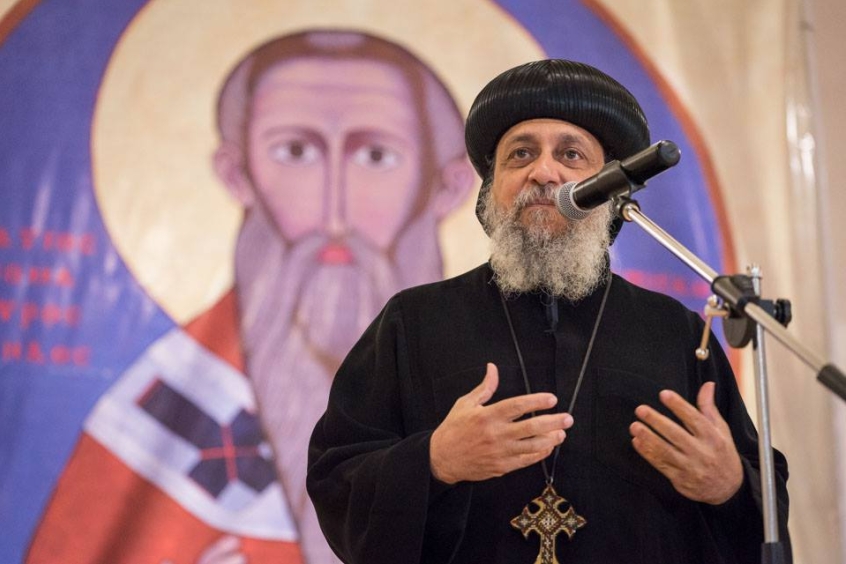
An Egyptian Coptic bishop has spoken about the profound power of martyrdom in the 21<sup>st century, as the Coptic community continues to mourn Egypt's Palm Sunday church bombings that killed at least 45 and injured over 100.
Bishop Thomas of the Coptic bishopric of Al-Quosia, Upper Egypt, spoke in an interview to the World Council of Churches. He described how Christians in Egypt have fought the fear of militant terror and anti-Christian persecution with the idea of martyrdom.
In 2015 21 young Coptic Christians were beheaded by ISIS in Libya, with footage of the killings released online. Egyptian Christians, the bishop said, were able to watch the video to the end because 'They shared the suffering with those who were beheaded.
'And suddenly they observed, that, at that moment when the knives were going to cut their heads, the young men pronounced the name of Jesus. Some days later the Coptic Church declared them officially as martyrs of the Church.'
The word 'martyr' comes from a Greek word meaning 'to witness'. Through martyrdom, those who suffer point to things beyond. It also means those left behind do not fear or hate those who took away their loved ones.
Bishop Thomas explained: 'When there is such a tragedy we always tell people not to be afraid of those who kill. Yes, they can take the body but what else can they do? They can't take the eternal glory. When you are not afraid, you are able to love, to forgive and to show strength.
'Don't forget that the story of the 21 young men in Libya started long before that day at the sea coast. They were kidnapped, they were tortured and threatened in an attempt to change their faith. But what these men did was pray and lift their eyes all the higher. When you turn your eyes higher, things on earth appear smaller.
The bishop was asked how Egyptian Copts, who make up about 10 per cent of Egypt's majority Muslim population, weren't more upset or afraid.
He said: 'Don't think that we don't mourn! When something like this happens to innocent people there are a lot of tears. But in martyrdom there is both at the same time: the pain of the cross and the joy of salvation.
'Just take the example of Mary, the Mother of God. She had to give her child, but she rejoiced in God. This is what Christians in Egypt feel.'
He later added: 'Carrying the suffering doesn't mean carrying hatred. And expressing pain and suffering doesn't mean that I'm afraid.'
Bishop Thomas said that fear in response to the rise of global terror was taking over the west, and allowing terrorists to win. 'If fear is ruling a society the idea of generalization can easily take over', he said.
'When there are some Muslims who kill Christians it's easy to feel that all Muslims are bad. But this is unjust. The answer on martyrdom can't be injustice.'
Egypt's president declared a national state of emergency after the Palm Sunday attacks.
In December, ISIS claimed responsibility for a Cairo Coptic church bombing that killed 27. In February, the jihadist group released a video inciting violence against the 'infidel' Christian faith community. At least seven individuals have been murdered by militants in northern Egypt since January 30, with victims being burned alive, stabbed in their sleep and shot in the street.
Hundreds of Coptic Christians fled the coastal city of El-Arish, Sinai in late February following an increasing terror threat from ISIS against the community. Bishop Angaelos, the head of the Coptic church in the UK, said Copts in the area were essentially told to 'leave or die'.
Bishop Thomas said that the Church plays an essential role for relatives of those martyred.
'First, we take care of the families, spiritually and financially', he said.
'The loss of a family member can mean a financial disaster for those who stay alive. If we don't answer these needs we will extend the injustice. Second, we do trauma healing and pastoral care as much as we can to make the families feel that they are not alone in their grief.
'Then the church is working for human rights. This becomes a necessity and a need. And finally, we ensure that love must be ensured among people. Everyone is in the circle of love and forgiveness, even the murderers. Our fight is a spiritual fight.'
While those who suffer can find meaning in sacrifice, the bishop was clear that 'martyrdom is always linked to injustice'. He emphasised a 'responsibility to work for justice. These brutal murders must be stopped.'













